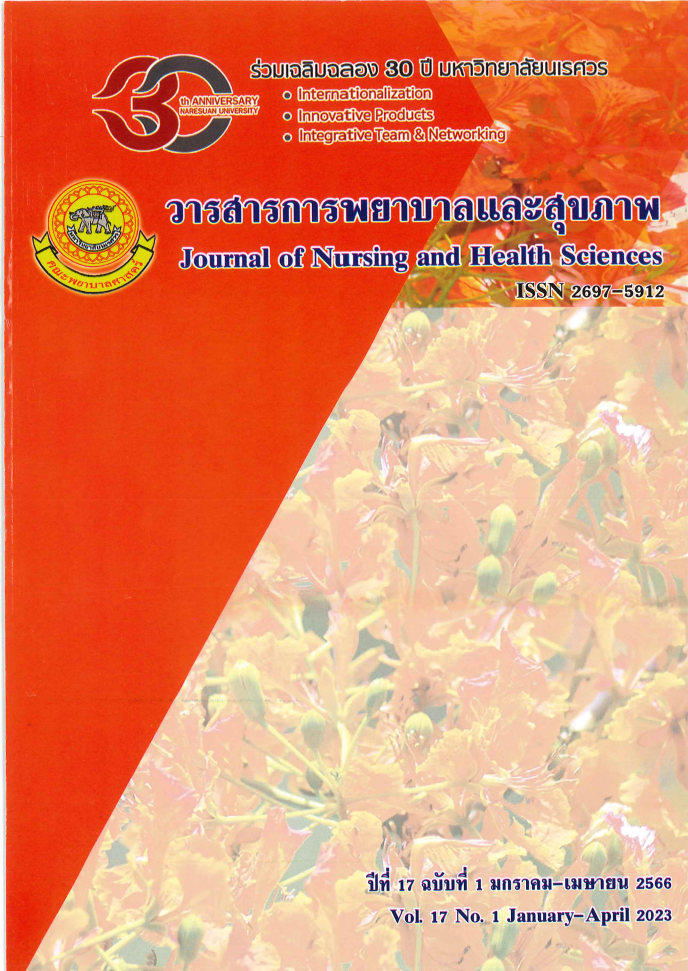The Study of the Game Addiction Problem Solving Needs and the Relationship between Personal Factor and Perception of Game Addiction Behaviors among School Age Children in Muang District, Phitsanulok Province
Main Article Content
Abstract
The purpose of this descriptive research study was to (1) explore the perceptions of children ‘s game addiction behaviors and the needs for problem solving of game addiction among school-age children and their parents and (2) examine the relationships among personal factor and children’s perceptions of game addiction. The study sample were students aged 10-15 years who are studying in the second semester of the academic year 2021 in the opportunity expansion schools located in Muang District, Phitsanulok Province. The sample size were 250 children and 250 children's parents. The research instruments consist of: (1) personal data, (2) Child and Parent Version of Game Addiction Screening Test (GAST) for children and parents (Standard research instrument) reliability which were 0.87, 0.89, respectively, (3) Perceived Behavior Questionnaire Child and Parents Problem Solving Game Addiction Needs Questionnaire. The tools were assessed content validity which were 0.78, 0.82 and reliability which were 0.81, 0.86, respectively. Data were analyzed by using descriptive statistics including frequency, percentage, mean, and standard deviation, and eta coefficient, spearman rank correlation coefficient statistics which used to examine the relationships among personal factor and children’s perceptions of game addiction.The study results revealed that (1) most of school-age children (65.2 %) had normal level of perception of their gaming behaviors. While female students had perception of their game addiction at the level of mania for 20.6 % and likely to be addicted to games for 14.0 %, 28.1% consistent of boys perceived game addiction and likely to be addicted to games for 7.0 % . In contrast to for parents’ perceptions, they reported that game addiction of their children at the level of addicted game for 20.0 % which likely to be addicted to the game and 18.8 % at the level of madness. Whereas school-age children reported the greatest need for emotional support, their parents reported the highest need for support in assessment especially which to provide feedback and (2) from the study of correlation variables, it was found that gender, educational
Article Details

This work is licensed under a Creative Commons Attribution-NonCommercial-NoDerivatives 4.0 International License.
References
Apisitwasana, N., Srichairattanakull, J., & Thiammok, M. (2021). Game addiction situation and factors affecting to game addiction among primary school student under NakhonPathom primary educational service area office 2. Journal of health and nursing research, 37(3), 254-266. [In Thai].
Aunjaroenkul, W., & Teaukul, S. (2016). Game addiction ammong the primary school students under the Bangkok Metropolitan Education office in Sathorn district. Journal of Clinical Psychology, 48(1), 1-12. [In Thai].
Baysak, E., Yertutanol, F. D. K., Dalgar, I., & Candansayar, S. (2018). How game addiction rates and related psychosocial risk factors change within 2-Years: A follow-up study. Psychiatry Investigation, 15(10), 984-990. doi:10.30773/pi.2018.08.16
Charoenwanit, S. (2014). Game addiction behaviors: Impacts and preventions. Thai Science and Technology Journal, 22(6), 871-879. [In Thai].
Chachvarat, P., & Pechkwang, D. (2013). Factors related to game addiction among teenagers. Kasalongkham Research Journal, 7(1), 39-48. [In Thai].
Chung, T., Sum, S., Chan, M., Lai, E., & Cheng, N. (2019). Will esports result in a higher prevalence of problematic gaming? A review of the global situation. Journal of Behavioral Addictions, 8(3), 384-394. doi:10.1556/2006.8.2019.46
House, J.S. (1981).The nature of social support. In M.A.Reading (Ed.), Work stressand social support. California: Addison–Wesley.
Kolkijkovin, V., Wisitpongaree, C., Techakasem, P., Pornnoppadol P., & Supawattanabodee, B.. (2015). Computer game addiction: Risk and protective factors in students in Dusit District, Bangkok. Vajira Medical Journal, 59(3), 1-13. [In Thai].
Nakon, A., & Kumruangrit, S. (2020). Factors related to game addiction among Prathom Suksa 4-6 School children. Journal of Social Sciences and Humanities, 46(2), 111-141. [In Thai].
Nontachot., P. (2015). The development of the prevention models of computer game addiction problems for the youth by community participation in Muang Uttaradit Municipality. Journal of Social Academic, 8(1), 1-13. [In Thai].
Pengpan, K. (2017). Preventing health problems of childhood addicted to online games.
Journal of Ratchathani Innovative Health Sciences, 1(1), 16-32. [In Thai].
Pornnoppadon, C. (2018). Internet gaming disorder. In S. Sucharitpong, R. Roongpraiwan, T. Hansakunachai, B. Benjasuwantep, A. Fuengfoo, J. Chuthapisith, & P. Rojmahamongkol (Eds.). Child development and behavior volume 4 (pp. 645-661). Bangkok: PA Living.
Saunders, J. B., Hao, W., Long, J., King, D. L., Mann, K., Fauth-Bühler, M., . . . Poznyak, V. (2017). Gaming disorder: Its delineation as an important condition for diagnosis, management, and prevention. Journal of Behavioral Addictions, 6(3), 271-279. doi:10.1556/2006.6.2017.039
Theeranate, C. (2011). The impact of media on children and adolescents' health. In T. Hansakunachai, R. Roongpraiwan, C. Theeranate, A. Fuengfoo, S. Sucharitpong, & P. Noipayak (Eds.). Child development and behavior for general practice (pp. 268-284). Bangkok: Beyond Enterprise.
Taechoyotin, P., Tongrod, P., Thaweerungruangkul, T., Towattananon, N., Teekapakvisit, P., Aksornpusitpong, C., . . . Piyaraj, P. (2020). Prevalence and associated factors of internet gaming disorder among secondary school students in rural community, Thailand: A cross-sectional study. BMC research notes, 13(1), 1-7. doi:10.1186/s13104-019-4862-3
Visanuyothin, T., Wanpen W., Wichai S., Arunruang, P., Yothinchatchawan C., Thiamsaeng, T.,…Late, N..(2013). A survey of risk behavior problems and game addiction among students in pilot schools of the student support system. Retrieved from http://new.smartteen.net/_admin/file-downloadlist/FM-441-1559223711.pdf
Varma, P., & Cheasakul U. (2016). The influence of game addiction and internet addiction among university students on depression stress and anxiety mediated by self-regulation and social support. Journal of Business Administration, 5(2), 45-57. [In Thai].


